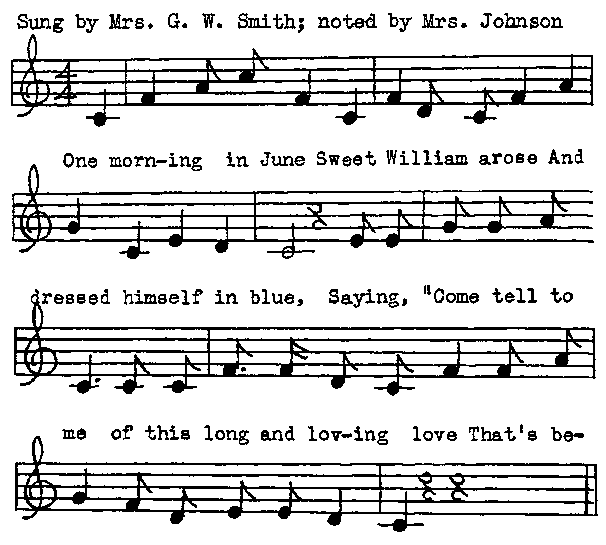Sweet William- Smith (IN) 1935 Brewster A
[From Brewster: Ballads and Songs of Indiana; 1940. His notes follow.
R. Matteson 2014]
11. FAIR MARGARET AND SWEET WILLIAM (Child, No. 74)
Five variants of "Fair Margaret and Sweet William" have been contributed to the Indiana collection. They resemble Child B in the conversation between William and the ghost of Margaret and in the rose-and-briar ending, but are like A in that the dream is William's instead of his bride's. The story, briefly, is this: Sweet William arises early one morning and dresses in blue. He says that there is no strong bond between Lady Margaret and himself, and adds that on the morrow she will see his bride. As he and his bride pass by, Lady Margaret is standing in her bower window (or door) combing her hair. In her emotion she drops the ivory comb, dashes out, and is never seen again. That night her ghost appears at Sweet William's bedside and asks how he likes his bride. His reply is that he likes best the lady who stands at the foot of the bed. He wakes, tells his bride of a fearful dream, and asks her permission to visit Lady Margaret. He is admitted by the latter's brothers, who inform him that she is dead and in her coffin. He kisses her farewell, and dies of sorrow. They are buried side by side, and plants entwine above their graves.
For American texts, see Barry, Eckstorm, and Smyth, p. 134 (two variants and one air); Belden, No. 5; Brown, p. 9; Campbell and Sharp, No. 17; Cox, p. 65 (seven variants); Davis, p. 221 and p. 570 (melodies); Hudson, Folksongs, p. 87; McGill, p. 69; Mackenzie, Ballads, p. 25; Mackenzie, p. 124; Scarborough, Song Catcher, p. 103; Shearin, p. 3; Shearin and Combs, p. 8; Wyman and Brockway, p. 94; Journal, XIX, 281; XXIII, 381; XXVII, 154; XXVIII, 200; XXX, 303; XXXI, 74; XXXV, 340; JFSS, II, 289; III, 64; Randolph, The Ozarks: An American Survival of Primitive Society, 182-83 (text and air); Neely, Tales and Songs of Southern Illinois, pp. 141-42.
A. "Sweet William." Contributed by Mrs. G. W. Smith, of Oakland City, Indiana. Gibson Comity. June 8, 1935. With music.

1. One morning in June Sweet William arose
And dressed himself in blue, Saying,
"Come tell unto me of the long and loving love
That's betwixt Lady Margaret and you."[1]
2. "O I know nothing of Lady Margaret," said he;
"Lady Margaret knows nothing of me,
But tomorrow morning by eight o'clock
Lady Margaret my bride shall see.
3. Lady Margaret was standing in her own bowery-door[2]
A-combing up her hair,
When who should she see but Sweet William and his bride
To the church as they passed by.
4. She quickly dropped her ivory comb,
And tied her hair all before,
And out of that door went a gay lady
That was never seen there any more.
5. The day being gone and the night coming on
When men were all asleep,
Sweet William he saw Lady Margaret's ghost
A-standing at his bed's feet.
6. "How do you like your bed?" said she;
"And how do you like your sheets?
And how do you like that pretty fair maid
That lies in your arms asleep?"
7. "O I like my bed very well," said he;
"Much better I like my sheets;
But the best of all is that pretty fair maid
That stands at my bed's feet."
8. Then he called up his old servants,
By one, by two, by three;
But the last of all he asked his own bride
If he might Lady Margaret go see.
9. "O what will you do with Lady Margaret?" she said;
"And what will you do with me?"
"O it's first I will Lady Margaret go see,
And then I'll return unto thee."
10. He went unto Lady Margaret's room
And knocked at the door;[3]
There was none so ready as her own seventh brother
To arise and let him in.
11. "O where is Lady Margaret?" said he;
"Is she not in her hall?
Or is she in her high-bound chamber
Amongst her merry maids all?"
12. "No, she is not in her kitchen," said they;
"Nor she is not in her hall,
But she is in her own coffin
Laid out against yon wall."
13. "Roll up, roll up those fine Holland sheets
That I may go and see,
That I may kiss those clay-cold lips
That ofttimes have kissed me."
14. 'T was first he kissed her rosy cheek
And then her rosy chin,
But the last of all was her clay-cold lips
That pierced his heart within.
15. "Roll up, roll up those fine Holland sheets
That's made of the Holland so fine,
For today they hang over Lady Margaret's corpse
And tomorrow they will hang over mine."
16. They buried her in the old churchyard;
They buried him by her side;
And out of her grave a red rosy grew,
And out of his a brier.
17. They grew and grew up the church steeple wall
Till they couldn't grow any higher,
And there they twined in a truelover's knot,
The rosy and the brier.
Footnotes:
1 This is, of coarse, said to Sweet William, not by him.
2. For bower door.
3. It will be noted that the rhyme requires pin.